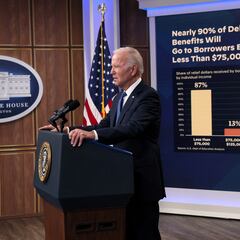Light bulb ban: When does it start and how does it affect you?
To lessen carbon emissions and help consumers cut down on their electricity bills, the government has banned the sale of common incandescent light bulbs.


The government has banned the sale of common incandescent light bulbs effective August 1 to implement a new energy efficiency standard.
The Department of Energy finalized a rule in April 2022, stating that bulbs must emit a minimum of 45 lumens per watt. This effectively excludes the common incandescent bulb found in many homes, as these usually produce only 15 lumens per watt. A lumen is a unit of brightness.
READ ALSO: How much student debt relief has Biden approved?
Why ban incandescent light bulbs?
Incandescent bulbs are highly inefficient in converting electricity into light. The majority of the energy they consume is lost as heat, making them inefficient for lighting purposes. This high energy consumption leads to increased greenhouse gas emissions, contributing to climate change and air pollution.
Consumers will likely turn to LED (light-emitting diode) bulbs, which provide 75 lumens or more per watt. Incandescent bulbs also have a relatively short lifespan compared to LED bulbs. According to the DOE, a good quality LED bulb can last 30 times longer than an incandescent one. This means the more efficient LEDs would need to be replaced less frequently, leading to lower waste generation.
CBS: “Incandescent light bulbs are now banned in the United States”
— The Post Millennial (@TPostMillennial) August 2, 2023
pic.twitter.com/Kf2mMpuYW3
READ ALSO: A third criminal indictment in 2023 for Donald Trump
Will I have to dispose of my incandescent bulbs?
Related stories
You do not need to throw out any incandescent bulbs you already have. The ban only applies to the manufacture and sale of bulbs that do not conform to the lumens standard, not their use. People can still use those that they may have already purchased until they burn out.
The Department of Energy projects that the ban will save consumers almost $3 billion in electricity bills every year. The move is also estimated to reduce carbon emissions by 222 million metric tons over the next three decades.

